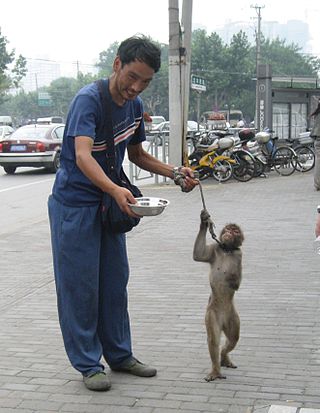
Peter Albert David Singer is an Australian moral philosopher and the Ira W. DeCamp Professor of Bioethics at Princeton University. He specialises in applied ethics, approaching the subject from a secular, utilitarian perspective. He wrote the book Animal Liberation (1975), in which he argues for veganism, and the essay "Famine, Affluence, and Morality", which favours donating to help the global poor. For most of his career, he was a preference utilitarian, but he revealed in The Point of View of the Universe (2014), coauthored with Katarzyna de Lazari-Radek, that he had become a hedonistic utilitarian.

Speciesism is a term used in philosophy regarding the treatment of individuals of different species. The term has several different definitions within the relevant literature. A common element of most definitions is that speciesism involves treating members of one species as morally more important than members of other species in the context of their similar interests. Some sources specifically define speciesism as discrimination or unjustified treatment based on an individual's species membership, while other sources define it as differential treatment without regard to whether the treatment is justified or not. Richard Ryder, who coined the term, defined it as "a prejudice or attitude of bias in favour of the interests of members of one's own species and against those of members of other species." Speciesism results in the belief that humans have the right to use non-human animals, which scholars say is pervasive in the modern society. Studies increasingly suggest that people who support animal exploitation also tend to endorse racist, sexist, and other prejudicial views, which furthers the beliefs in human supremacy and group dominance to justify systems of inequality and oppression.

Great ape personhood is a movement to extend personhood and some legal protections to the non-human members of the great ape family: bonobos, chimpanzees, gorillas, and orangutans.

Vivisection is surgery conducted for experimental purposes on a living organism, typically animals with a central nervous system, to view living internal structure. The word is, more broadly, used as a pejorative catch-all term for experimentation on live animals by organizations opposed to animal experimentation, but the term is rarely used by practising scientists. Human vivisection, such as live organ procurement, has been perpetrated as a form of torture.

Animal Liberation: A New Ethics for Our Treatment of Animals is a 1975 book by Australian philosopher Peter Singer. It is widely considered within the animal liberation movement to be the founding philosophical statement of its ideas. Singer himself rejected the use of the theoretical framework of rights when it comes to human and nonhuman animals. Following Jeremy Bentham, Singer argued that the interests of animals should be considered because of their ability to experience suffering and that the idea of rights was not necessary in order to consider them. He popularized the term "speciesism" in the book, which had been coined by Richard D. Ryder to describe the exploitative treatment of animals.

Whole Foods Market, Inc., a subsidiary of Amazon, is an American multinational supermarket chain headquartered in Austin, Texas, which sells products free from hydrogenated fats and artificial colors, flavors, and preservatives. A USDA Certified Organic grocer in the United States, the chain is popularly known for its organic selections. Whole Foods has more than 500 stores in North America and seven in the United Kingdom As of March 4, 2019.

Alexander Fernando Pacheco is an American animal rights activist. He is the founder of 600 Million Dogs, co-founder and former chairman of People for the Ethical Treatment of Animals (PETA) and a member of the advisory board of the Sea Shepherd Conservation Society.
Job Seda, better known as Ayub Ogada, was a Kenyan singer. He was a singer favoring the nyatiti as his characteristic instrument. His music is known to have a natural feel to it, having songs of birds, the calls of animals and the sounds of children playing in the background.

Animal rights is the philosophy according to which many or all sentient animals have moral worth independent of their utility to humans, and that their most basic interests—such as avoiding suffering—should be afforded the same consideration as similar interests of human beings. Broadly speaking, and particularly in popular discourse, the term "animal rights" is often used synonymously with "animal protection" or "animal liberation". More narrowly, "animal rights" refers to the idea that many animals have fundamental rights to be treated with respect as individuals—rights to life, liberty, and freedom from torture that may not be overridden by considerations of aggregate welfare.

Ruth Harrison was an English animal welfare activist and writer.

Karen Dawn is an American animal rights and welfare advocate and writer.
Matthew Michael Ball is an American animal activist. He is co-founder and President of One Step for Animals.

Not Dead Yet (NDY) is a United States disability rights group that opposes assisted suicide and euthanasia for disabled people. Diane Coleman, is the founder and president.
Animal Charity Evaluators (ACE), formerly known as Effective Animal Activism (EAA), is a US-based charity evaluator and effective altruism-focused nonprofit founded in 2012. ACE evaluates animal charities and compares the effectiveness of their different campaigns and strategies. The organization makes charity recommendations to donors once a year. Its stated purpose is finding and promoting the most effective ways to help animals.

The predation problem or predation argument refers to the consideration of the harms experienced by animals due to predation as a moral problem, that humans may or may not have an obligation to work towards preventing. Discourse on this topic has, by and large, been held within the disciplines of animal and environmental ethics. The issue has particularly been discussed in relation to animal rights and wild animal suffering. Some critics have considered an obligation to prevent predation as untenable or absurd and have used the position as a reductio ad absurdum to reject the concept of animal rights altogether. Others have criticized any obligation implied by the animal rights position as environmentally harmful.

Yves Bonnardel is a French philosopher, essayist and editor, libertarian, egalitarian and antispeciesist activist. He is one of the founding members of the French-language journal Cahiers antispécistes and of the events Veggie Pride, Les Estivales de la question animale and the march to close all slaughterhouses.

Valéry Giroux is a Canadian philosopher, lawyer and animal rights activist from Quebec.














